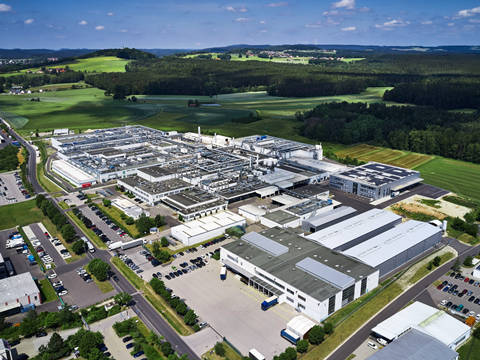
Leonhard Kurz is implementing ENERGYNEST’s power-to-heat system with thermal storage into its thin-film technology, aiming to provide heat on-demand while lessening its reliance on natural gas and decarbonizing its manufacturing processes.
As a supplier of advanced surface decoration solutions across various industries, Leonhard Kurz already claims to source 100% renewable electricity at its German operations and aspires to achieve carbon-neutral production by 2040.
Yet their decorations are produced with process heat at high temperatures, and this is traditionally supplied by natural gas boilers. At its facility in Sulzbach-Rosenberg, Leonhard Kurz is said to consume over 4 GWhth of process heat every year, which apparently makes it a ‘prime candidate’ for electrification and emissions reduction.
While power-to-heat technology converts renewable electricity into high-temperature heat, the addition of advanced thermal storage is set to make it a ‘reliable, flexible, and carbon-free’ energy source for industrial processes. This is expected to help manufacturers become less dependent on fossil fuels without sacrificing operational efficiency.
ENERGYNEST’s turnkey power-to-heat solution features a 3 MWe electrical heater and a 12 MWhth ThermalBattery; it is expected to integrate ‘seamlessly’ into its existing thermal oil infrastructure.
Leonhard Kurz anticipates that the system will deliver over 3 GWhth of clean heat annually and cover over 70% of the heat demand for one of the site’s production lines, while over 40% of heat demand is set to be met directly from stored heat. This is believed to boost energy efficiency and reliability.
In turn, it expects to utilize excess solar energy from its on-site PV field and reduce its consumption of natural gas by over 3.5 GWh per year – reducing its CO2 emissions by over 700 tons, the company says.
The partners hope that demonstrating a power-to-heat system will prove the solution’s practicality; encourage the global, widespread adoption of a scalable, repeatable model for industrial heat decarbonization; and, in turn, promote industrial electrification in key manufacturing sectors across the world.
It is also expected to align with the European Green Deal, Fit for 55, and other decarbonization initiatives across the EU.
“Electrification of industrial heat is essential for decarbonizing global manufacturing and supply chains,” explained ENERGYNEST CEO Alex Robertson. “By partnering with Leonhard Kurz, ENERGYNEST is showcasing a scalable and effective decarbonization strategy that can be replicated worldwide.
“This agreement is a proof point that industrial energy transition is not just a necessity — it’s happening now.”
“Sustainability is deeply embedded in our corporate DNA, guiding every aspect of our operations and innovation,” continued Leonhard Kurz CEO Dr. Andreas Hirschfelder. “By integrating ENERGYNEST’s power-to-heat system with thermal storage, we are significantly reducing emissions and taking another major step toward our goal of a fully sustainable production lifecycle and CO2 neutrality.
“This project reinforces our commitment of being a ‘Green Leader’ in the industry.”
Ralph Hopfensitz, executive senior vice president Global Technology at Leonhard Kurz, added: “The shift to electrified, renewable-based industrial heat is a game changer for manufacturing.
“By leveraging ENERGYNEST’s advanced thermal storage technology, we ensure a stable, on-demand heat supply that reduces our dependence on fossil fuels while increasing energy efficiency. This is a pivotal innovation that strengthens our long-term energy strategy and accelerates our transition towards CO2-neutral production.”
Earlier this year, BASF announced that it had successfully converted all its Performance Materials division’s European plants into renewable electricity; this powers the compounding of its Engineering Plastics, Polyurethanes and Thermoplastic Polyurethanes, and Specialty Polymers. The transition is also set to benefit the company’s value chain in the production of base polymers and other precursors for Engineering Plastics and Polyurethanes.
On a wider scale, over €100 billion will be dedicated to rolling out renewable energy, boost Europe’s clean tech manufacturing capacity, and decarbonizing industry as part of the upcoming Clean Industrial Deal. However, the European Container Glass Federation (FEVE) is concerned that certain sectors may be singled out for funding at the expense of container glass – emphasizing that investment, policy certainty, and access to energy are essential to achieving climate neutrality.
If you liked this story, you might also enjoy:
Reuse vs. single use – which is better for the environment?
Sustainable Innovation Report 2025: Current trends and future priorities
What can the world learn from South Korea’s world-leading performance in plastics circularity?













No comments yet